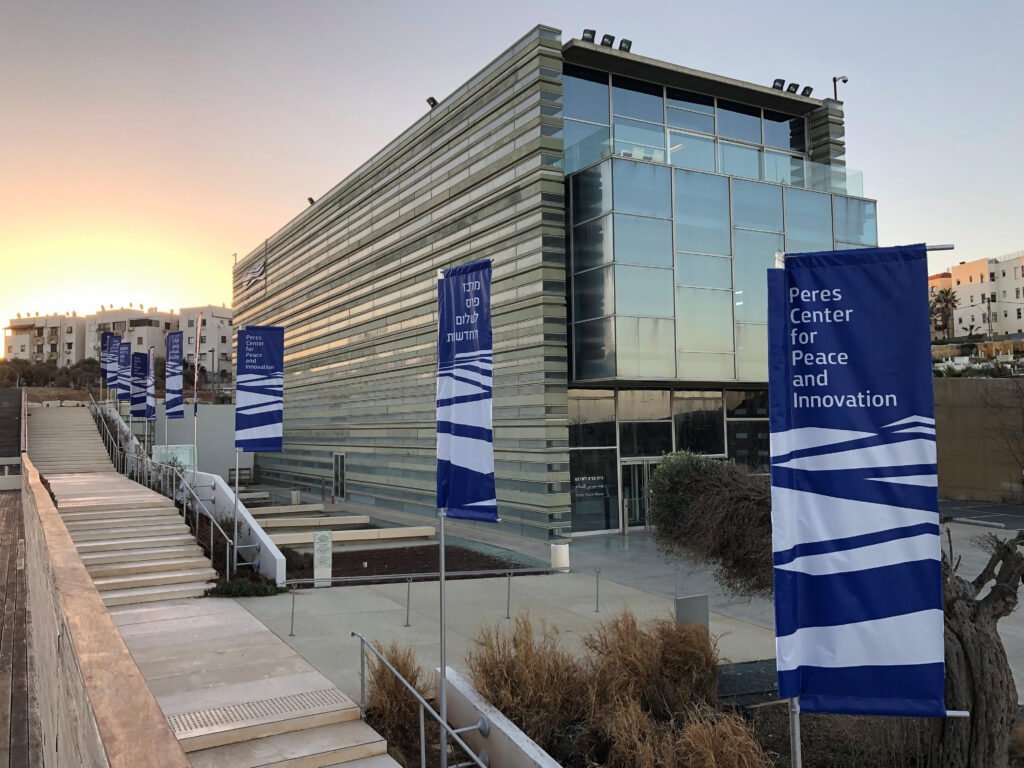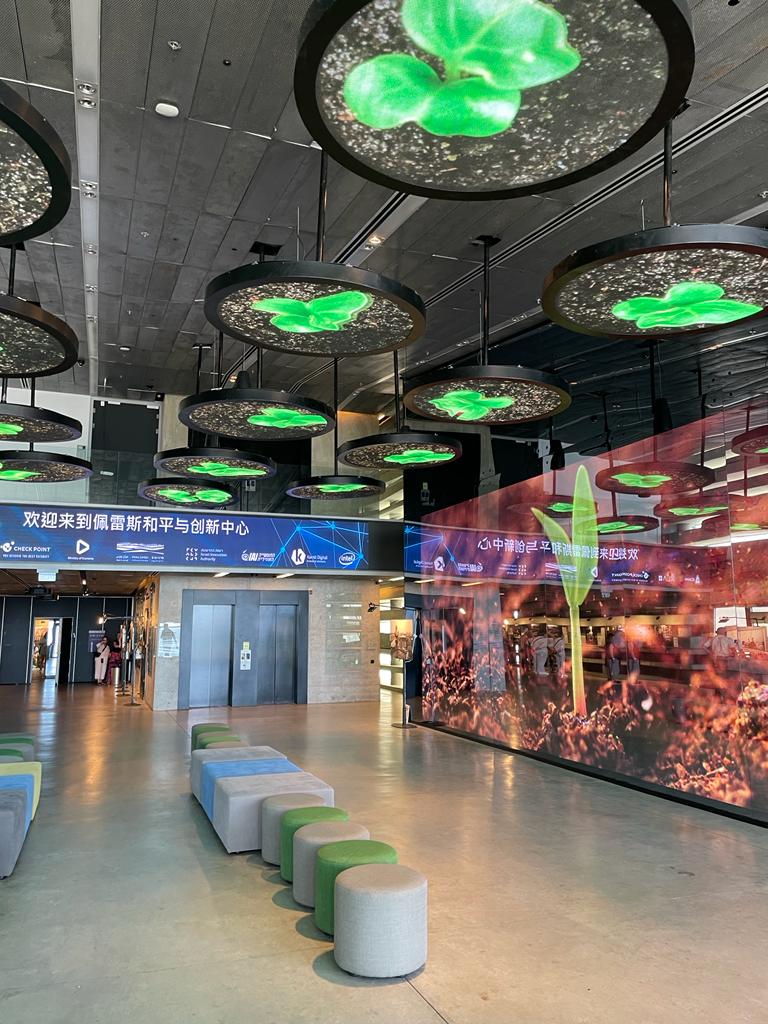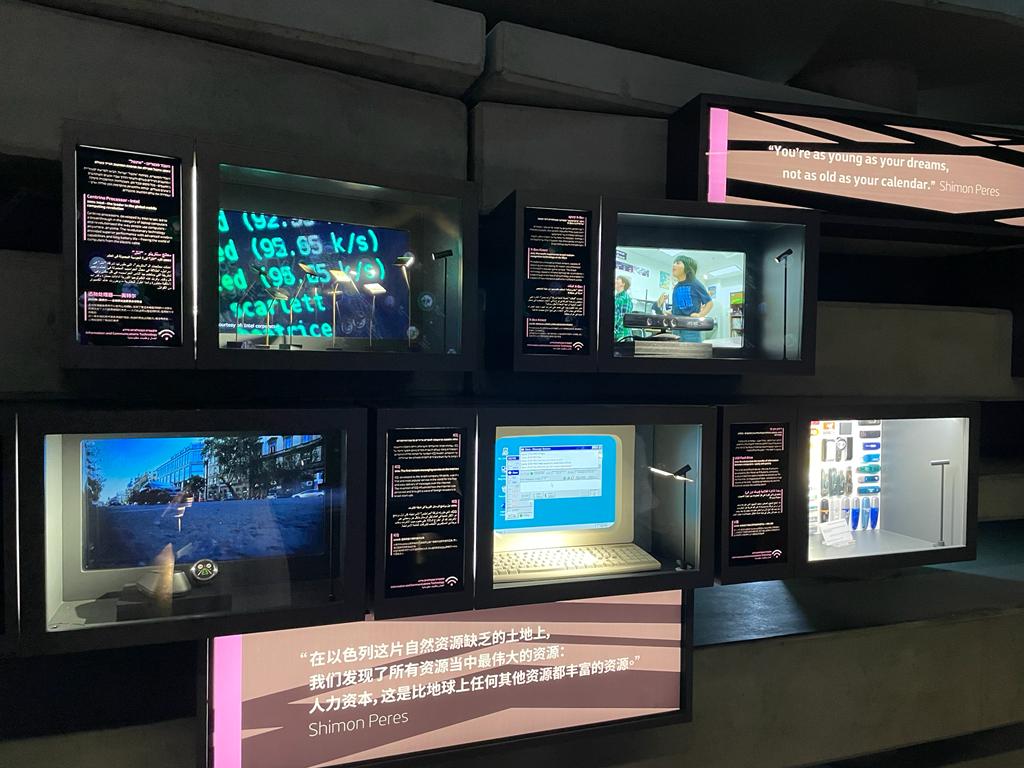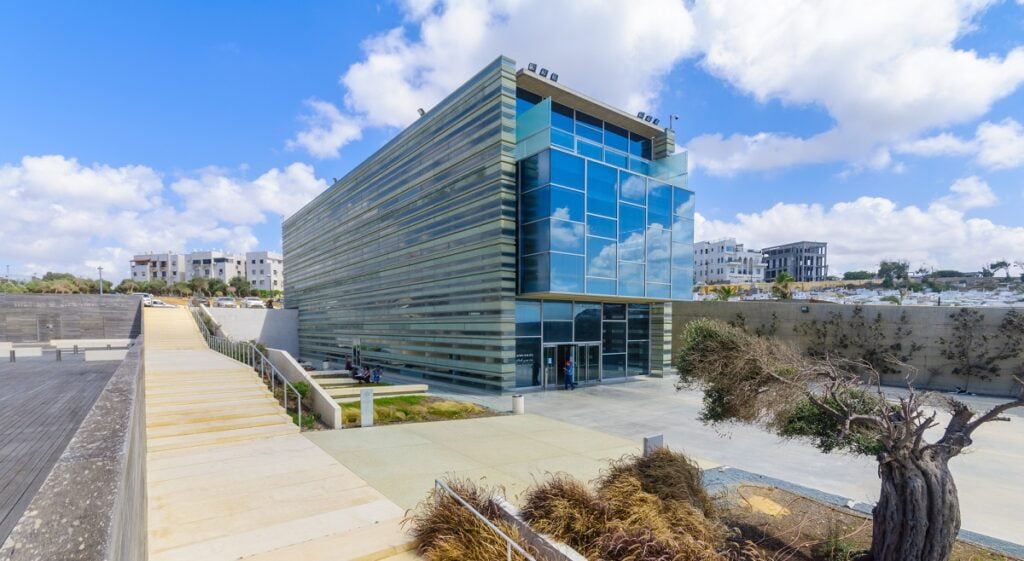At the core of peace and innovation is a mutual belief in one’s own power to change the world, Yarden Leal-Yablonka, deputy director-general of the Peres Center for Peace and Innovation, tells NoCamels from Shimon Peres’s former sofa. They are two critical concepts that not only bolster a community but bolster one another. Concepts that are at the heart of Shimon Peres’s legacy and the Center’s ongoing work, she explains.
The Shimon Peres Center for Peace and Innovation serves as a physical hub of the Start-Up Nation in Jaffa. Founded by former Israeli Prime Minister and President Shimon Peres in 1996, the center uniquely highlights Israeli innovation and history.

The center’s building – which officially opened in 2019 – was inspired by former US President Barack Obama’s trip to Jerusalem a few years earlier, during which he asked to see the latest innovations from the Start-Up Nation. While an ad-hoc exposition was pieced together, Peres realized the need for a permanent home for innovation in Israel. By showcasing Israeli startups and crafting mentorship programs – like the Marketplace entrepreneurial mentorship event occurring this week – the center continues to propel Israeli innovation forward.
More than spotlighting Israeli innovation and peace – and the country with the largest number of startups per capita – Peres conceived the center with a greater goal in mind — to transform the Start-Up Nation into a “Start-Up Region.”
“We’ve been on the ground for 25 years already, established in 1996 by President Peres, with an original aim (which is still something we very much focus on) of privatizing peacebuilding. He completely understood, and we understand, that peace will be signed, at the end of the day, by brace politicians and statesmen. But peacebuilding can, and should, happen between people working on the foundations of shared living between Israel’s diverse communities. Peacebuilding needs to happen from the ground up between Israel and its neighbors,” Leal-Yablonka says.

The center is composed of two key elements: its physical Jaffa campus featuring Israeli innovation of the past, present, and future and a series of off-campus programming initiatives meant to build bridges through innovation in the greater Israel-Palestine region.
“We know that the startup nation is remarkable but it is not as diverse and inclusive as it should be, yet,” she adds.
The on-campus site features five key rooms shown to visitors during tours on Mondays, Wednesdays, Fridays, and Sundays. Visitors are first directed to the Secrets of Innovation room, where they can interact with 18 life-sized Israeli innovator holograms from a range of industries. The room places a premium on Israeli diversity, spotlighting the work of innovators from several identity backgrounds. Next, visitors are taken to a replica of Shimon Peres’s study (as his real office is closed to tours) to learn about the politician’s rich history. The Innovation Nation Room next features a timeline detailing how Israel became the Start-Up Nation, with examples of advancement from the eighteenth century to the present. The room features different sectors of Israeli innovation, highlighting how a country with a lack of natural resources and land became such a fruitful nation. The tour’s next stop, The Capsule, offers visitors a virtual reality experience to look into the future of Israeli technology. Lastly, The Israeli Expo showcases 45 current Israeli start-ups in the fields of ICT (Information, Communications, and Technology), Aerospace and Security, Healthcare, and Agriculture and Energy.
This last room, spotlighting ongoing Israeli innovation, specifically speaks to the center’s mission. Startups, upon being selected for a 1-2 year-long feature in the center, gain access to unique mentorship, speaker, and collaboration opportunities. The companies begin to work in what Leal-Yablonka describes as the Center’s “Dream Team” community: a group “which is always based on doing good and innovation for good,” she tells NoCamels.
Sign up for our free weekly newsletter
SubscribeThe center’s on-campus features are connected to and supplemented by off-campus programming. The organization offers several progressive flagship programs, ranging from entrepreneurship inclusivity to citizen-to-government connections to cross-border interactions to sports. The programs work to encourage innovation, high-tech activity, and entrepreneurship for Israelis and Palestinians, Jews and Arabs, and people of all ages, genders, and socioeconomic backgrounds.

One key program, Startup-Link, serves as a pre-accelerator program to train the next generation of young Palestinian entrepreneurial talent. Bringing together experienced Israeli innovators and young Palestinian innovators, the program aims to strengthen ties across borders and build “the foundations for an entrepreneurial and innovation ecosystem” in Palestine, Leal-Yablonka says.
Another key program – in line with Shimon Peres’s mission to help children – has provided emergency surgeries and medical aid in Israel for over 12,500 Palestinian and Syrian children. The program, Saving Children, works in tandem with the Training Doctors program, which aims to train Palestinian doctors and bolster the Palestinian medical system. The program has trained over 260 Palestinian healthcare professionals who, in turn, have treated over 1.5 Israeli patients. 90 percent of program graduates continue to serve in the Palestinian healthcare system, further helping medical care in the region.
The Center is continuing to expand its profile of collaborative programs. Just this week, the organization hosted its Marketplace event to create a platform for partnerships between 54 industry mentors and 120 young entrepreneurs. The first few days of the event involved a series of one-on-one online mentorship sessions between the leaders and entrepreneurs from a range of backgrounds – some from Israel’s periphery – and do-good industries. The week culminated in a large ecosystem event on June 23 hosted at the Peres Center building.
More than expanding its profile of mentorship events, the Center is also continuing to spread its impact across the country of Israel and the entire region. One of its emerging programs, Hazira, for example, is working to establish Innovation teams in several Israeli municipalities in collaboration with Bloomberg Philanthropies and the Israeli Ministry of Interior. The goal of the program is to help communities develop “innovative solutions to their most pressing challenges,” Leal-Yablonka tells NoCamels, and show that innovation is a “way of thinking and a way of doing.”

“Just with the 12 communities involved now, the number of overall Israelis that live in these cities is 1.5 million. So the impact of the program on their day-to-day life is immense,” she explains.
The center’s programs – as well as its physical space – allow Peres’ legacy to continue, as his ideals of peace and innovation continue to be integral to the Israeli nation. Peres’s emphasis on Tikkun Olam, the Jewish value of ‘world repair’, continues to drive the Center’s work.
“The physical space, but also our programmatic work which happens off-campus, embodies what we see Israel as and what we want to see Israel continue to be which is a strong, prosperous Jewish democratic state, which works hard to build the foundations for shared living between all of its citizens and also peace with its neighbors,” Leal-Yablonka says.
Related posts

Editors’ & Readers’ Choice: 10 Favorite NoCamels Articles

Forward Facing: What Does The Future Hold For Israeli High-Tech?

Impact Innovation: Israeli Startups That Could Shape Our Future




Facebook comments